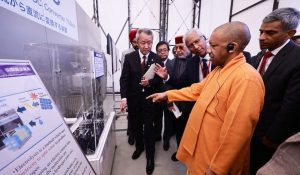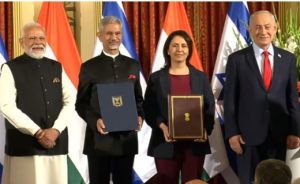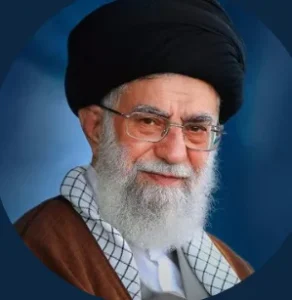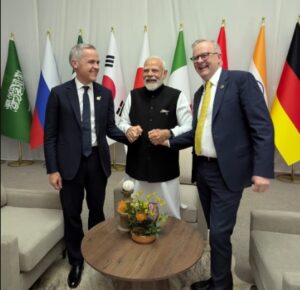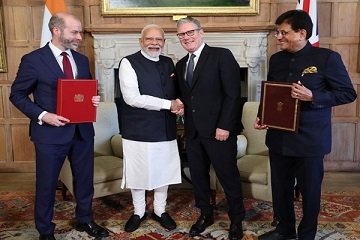
Last Updated on July 24, 2025 10:49 am by BIZNAMA NEWS
AMN
In a landmark development hailed as a turning point in bilateral ties, India and the United Kingdom have formally signed the Comprehensive Economic and Trade Agreement (CETA)—a historic free trade deal aimed at transforming the economic landscape between the two nations. The agreement was finalized during Prime Minister Narendra Modi’s official two-day visit to the UK and represents the most ambitious trade pact either country has signed in recent years.
Describing the moment as “historic,” Prime Minister Modi emphasized that the pact marks a new chapter in the evolving partnership between India and the UK. Addressing a joint press conference alongside British Prime Minister Keir Starmer, Modi said, “Today marks a historic day in our bilateral relationship. After years of intensive negotiations, we have concluded the Comprehensive Economic and Trade Agreement, which not only strengthens our economic bond but also serves as a roadmap for shared prosperity.”
The CETA is particularly significant as it represents the UK’s largest trade agreement since its departure from the European Union. For India, it’s one of the most comprehensive deals inked with any developed economy, underscoring its growing influence on the global trade stage.
According to PM Modi, the deal will open up enhanced market access for a wide range of Indian sectors, including textiles, leather, footwear, marine products, gems and jewellery, engineering goods, agricultural commodities, and processed foods. This, he said, would bring direct benefits to Indian farmers, artisans, MSMEs, youth, and women entrepreneurs.
Posting on social media platform X, Modi remarked that the agreement reflects the countries’ mutual desire to build a resilient and inclusive economic future. He highlighted that labour-intensive sectors stand to gain significantly, reinforcing India’s ambition to become a global manufacturing and export hub under the ‘Make in India’ initiative.
“The India-UK CETA will not only stimulate manufacturing and exports but also give Indian consumers access to high-quality foreign goods at affordable prices. It will further deepen our economic and strategic partnership,” PM Modi noted.
UK Prime Minister Keir Starmer echoed the sentiment, calling the CETA the UK’s most significant trade deal since Brexit. “This is a deal that will raise living standards, boost wages, and unlock new opportunities for businesses and workers across the UK,” Starmer said. He underlined its relevance to British industries—from Scotch whiskey distilleries in Scotland to tech firms and service providers in London, Leeds, and Manchester.
Starmer estimated the agreement would add £4.8 billion to the UK’s economy annually and generate £2.2 billion in additional wages. Consumers in the UK, he added, would enjoy better access to affordable Indian products such as clothing, seafood, spices, and electronics.
Calling it a “landmark deal,” Starmer emphasized that the pact not only promotes economic exchange but also strengthens diplomatic and cultural ties between the two nations. “It’s a deal that benefits both sides—supporting jobs, reducing trade costs, and bringing people closer,” he posted on X.
With this signing, India and the UK are set to redefine the contours of their economic engagement, offering renewed hope for a deeper, more inclusive, and sustainable global partnership.
Ask ChatGPT

